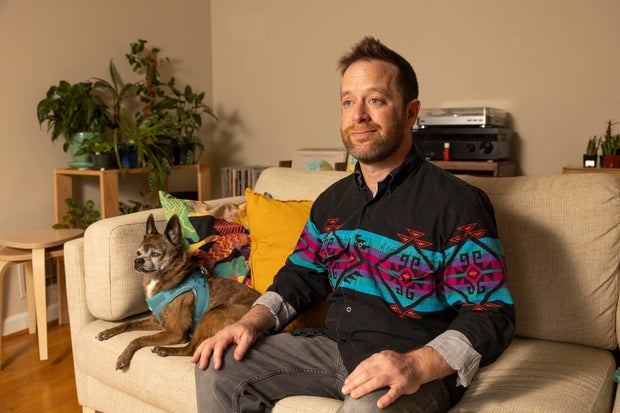CBS News
Insurance wouldn’t pay for his vasectomy. Such birth control coverage may become more elusive.

David Engler had been pretty sure he didn’t want children. Then a frustrating school day two years ago helped seal the deal for the now 43-year-old substitute teacher.
“It was wild. I had to call the office seven times to get kids pulled out,” he said. “The next day, I called Kaiser and said, ‘I’d like to know how much a vasectomy is.'”
A representative with Engler’s insurer, Kaiser Permanente, told him the procedure would be free because it was a form of birth control, he said. But after undergoing the vasectomy last winter, he received a bill for $1,080.
“I felt defeated, tricked and frustrated,” said Engler, who lives in Portland, Oregon.
Engler’s experience highlights how a labyrinthine patchwork of insurance coverage rules on reproductive health care creates confusion for patients. Oregon requires that vasectomies be covered for most people who work in the public sector. But the federal Affordable Care Act — which mandates that most health plans cover preventive health services, such as contraception, at no cost to the consumer — does not require vasectomies to be covered.
And that perplexity surrounding coverage may get more complicated.
An ongoing federal lawsuit aims to strike down the ACA‘s preventive care coverage requirements for private insurers. If the case knocks out the mandates, state-level laws — which vary widely across the country — would carry more weight, a change that would resume the “wild West” dynamic from before Obamacare, said Zachary Baron, a health policy researcher at Georgetown Law.
It would create an environment “in which insurers and employers pick and choose which services they want to cover or which services they want to charge for,” Baron said. “It would certainly threaten access to care for millions of Americans.”
Studies have shown the requirements to cover preventive care have reduced consumers’ out-of-pocket costs and increased their use of short- and long-term birth control methods.
The job of defining which contraceptive services should be covered falls to the Health Resources and Services Administration, or HRSA. Two other groups — the U.S. Preventive Services Task Force, or USPSTF, and the Advisory Committee on Immunization Practices, or ACIP — make recommendations on other kinds of care that the ACA requires insurers to cover.
The plaintiffs in the lawsuit, a group of individuals and Christian-owned businesses, argue the members of these three panels haven’t been properly appointed by Congress. They also say the recommendations for insurance plans to cover medication for HIV prevention violate their religious rights.
On June 21, the U.S. Court of Appeals for the 5th Circuit issued what it called a “mixed bag” opinion in the case. It said one group — the USPSTF — had not been properly appointed, and therefore its recommendations made after the ACA was signed into law were unconstitutional. The plaintiffs had asked for a nationwide ruling, but the court said only the plaintiffs’ organizations could be exempted from its recommendations.
The court then sent the plaintiffs’ challenges to the recommendations made by HRSA and ACIP — including those on contraception — back to a lower court to consider.
The case is likely headed to Reed O’Connor, a federal judge in Texas who has issued decisions undermining the ACA — including a ruling striking down the entire law that the U.S. Supreme Court later overturned.
“O’Connor is a judge notoriously hostile to the Affordable Care Act,” said Gretchen Borchelt, vice president of reproductive rights and health at the National Women’s Law Center. “He is someone who is willing to impose remedies where he takes access to care away from everybody in the country based on what’s happening in one situation.”
A win for the plaintiffs, she worried, could create confusion about what kind of contraception is covered and how much it costs, which would ultimately lead to more unintended pregnancies — all at a time when women have less access to abortions.
Nearly two dozen organizations — including the American Medical Association, the American Public Health Association and the Blue Cross Blue Shield Association — have joined Borchelt’s group in filing briefs warning about the potential disruptions a ruling for the plaintiffs could cause.
Jay Carson, an attorney with the Buckeye Institute, a conservative think tank, said he’s happy with the court’s ruling. His group, along with the state of Texas, filed briefs in support of the plaintiffs.
“Unelected bureaucrats” shouldn’t have the power to decide what insurance plans should be required to cover, said Carson. “We’ve gotten so far afield of Congress actually making the laws and, instead, relying on Congress to just empower some agency to do the heavy lifting.”
What power agencies do have is likely to be curtailed in the wake of a June 28 U.S. Supreme Court decision that overturned a decades-old precedent dictating that courts should defer to federal agencies when it comes to regulatory or scientific decisions.
“Courts are going to be more able to scrutinize experts,” said Richard Hughes, a health care regulatory attorney with the firm Epstein, Becker, and Green. “It’s a vibe shift — we’re moving in the direction of the administrative state being curtailed.”
Eliminating federal coverage requirements for contraception would leave it up to states to determine what services health insurance plans would be required to provide.
Fourteen states and Washington, D.C., currently protect the right to contraception. But states can go only so far with those rules, said Baron, because a federal statute prevents them from regulating self-funded health plans, which cover about 65% of workers.
“It would leave significant gaps in coverage,” Baron said.
A group of Democratic-led states made such an argument in a court brief last year, arguing for the mandates to be upheld to discourage self-funded plans from declining to offer preventive services, as they often did before the ACA.
Even when states can regulate what health plans cover, people still fall through the cracks. “I see denials all the time in instances where the treatment clearly is covered,” said Megan Glor, a health insurance attorney in Oregon.
Patients can appeal their insurers’ decisions, but that’s not easy. And if a patient’s appeals fail, litigation is generally the only option — but that’s a long, complicated, costly process, Glor said. Likely, the best outcome for a patient is an insurer covering what should have been covered in the first place.
When Engler called Kaiser Permanente about his vasectomy charge, he said a representative told him the bill was sent by mistake. Still, he said, the insurer kept asking for money. Engler filed and lost multiple appeals and eventually settled the charge for $540.
Kristina Barker for KFF Health News
Engler’s vasectomy likely should have been free, Glor said. As a teacher, Engler is a public sector employee, which means his insurance would be subject to an Oregon law that mandates no-cost coverage for vasectomies.
Kaiser Permanente told KFF Health News that state law does not apply because of a federal rule for high-deductible health plans paired with health savings accounts. That rule requires patients to cover out-of-pocket costs until their deductible is met.
However, after KFF Health News contacted Kaiser Permanente about Engler’s situation, he said the company promised to issue a full refund for the $540 he had paid to settle his case.
“Although we administered the benefit correctly, an employee who spoke with Mr. Engler told him incorrectly that he would not have” to share the cost, said Debbie Karman, a Kaiser Permanente spokesperson.
Engler said he’s happy with the outcome, though he’s still unsure how Kaiser Permanente’s staff was confused about his insurance coverage.
He worries that others don’t have the means he had to advocate for himself.
“It’s scary,” he said. “So many people are limited in their resources or their understanding of how to fight — or even who to fight.”
KFF Health News is a national newsroom that produces in-depth journalism about health issues and is one of the core operating programs at KFF — the independent source for health policy research, polling and journalism.
CBS News
Dishing up space food – CBS News

Watch CBS News
Be the first to know
Get browser notifications for breaking news, live events, and exclusive reporting.
CBS News
In praise of Seattle-style teriyaki

Watch CBS News
Be the first to know
Get browser notifications for breaking news, live events, and exclusive reporting.
CBS News
Gazan chefs cook up hope and humanity for online audience

Renad Atallah is an unlikely internet sensation: a 10-year-old chef, with a repertoire of simple recipes, cooking in war-torn Gaza. She has nearly a million followers on Instagram, who’ve witnessed her delight as she unpacks parcels of food aid.
CBS News
We interviewed Renad via satellite, though we were just 50 miles away, in Tel Aviv. [Israel doesn’t allow outside journalists into Gaza, except on brief trips with the country’s military.]
“There are a lot of dishes I’d like to cook, but the ingredients aren’t available in the market,” Renad told us. “Milk used to be easy to buy, but now it’s become very expensive.”
I asked, “How does it feel when so many people like your internet videos?”
“All the comments were positive,” she said. “When I’m feeling tired or sad and I want something to cheer me up, I read the comments.”
We sent a local camera crew to Renad’s home as she made Ful, a traditional Middle Eastern bean stew. Her older sister Noorhan says they never expected the videos to go viral. “Amazing food,” Noorhan said, who added that her sibling made her “very surprised!”
After more than a year of war, the Gaza Strip lies in ruins. Nearly everyone has been displaced from their homes. The United Nations says close to two million people are experiencing critical levels of hunger.
Hamada Shaqoura is another chef showing the outside world how Gazans are getting by, relying on food from aid packages, and cooking with a single gas burner in a tent.
Shaqoura also volunteers with the charity Watermelon Relief, which makes sweet treats for Gaza’s children.
In his videos online, Shaqoura always appears very serious. Asked why, he replied, “The situation does not call for smiling. What you see on screen will never show you how hard life is here.”
Before dawn one recent morning in Israel, we watched the UN’s World Food Program load nearly two dozen trucks with flour, headed across the border. The problem is not a lack of food; the problem is getting the food into the Gaza Strip, and into the hands of those who desperately need it.
The UN has repeatedly accused Israel of obstructing aid deliveries to Gaza. Israel’s government denies that, and claims that Hamas is hijacking aid.
“For all the actors that are on the ground, let the humanitarians do their work,” said Antoine Renard, the World Food Program’s director in the Palestinian territories.
I asked, “Some people might see these two chefs and think, well, they’re cooking, they have food.”
“They have food, but they don’t have the right food; they’re trying to accommodate with anything that they can find,” Renard said.
Even in our darkest hour, food can bring comfort. But for many in Gaza, there’s only the anxiety of not knowing where they’ll find their next meal.
For more info:
Story produced by Mikaela Bufano. Editor: Carol Ross.
See also:
“Sunday Morning” 2024 “Food Issue” recipe index
Delicious menu suggestions from top chefs, cookbook authors, food writers, restaurateurs, and the editors of Food & Wine magazine.










